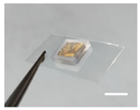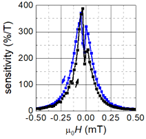Development of magnetoresistive sensors in the body temperature range for neural activity detection
HOST INTITUTION
IMDEA Nanociencia (Spain)
PhD PROJECT DESCRIPTION
The aim of the project is the complete characterization of magnetoresistive sensors from room to body temperature, including the development and optimization of the associated electronics. The properties of the sensors developed by the researchers R3 (in CNRS-GREYC) and R4 (in CEA) will be studied and compared to state-of-the-art commercial sensors of high performance but not suitable for implantation. The researcher will be responsible for preparing probes including the sensors and electrodes for their use in biological environments. Special care will be taken to encapsulate the sensors to ensure smooth integration in living tissues. The researcher will take part in recordings of the neural magnetic signals under in vitro and in vivo conditions with these sensors, aiming to correlate the electrical signals recorded using electrodes with the magnetic signals. The recruited researcher will receive training in nanomagnetism, spintronics, and advanced low-noise electronics. Cleanroom microfabrication techniques will be essential for the integration of the sensors into soft substrates.
During the doctorate, it is intended that the researcher will undertake the following secondments:
- At ATLAS Neuro (Leuven, Belgium) under the supervision of Arno Arts to contribute to the implementation of magnetic sensors into full neural interfaces
- At Laura Ballerini’s group (SISSA, Trieste, Italy) to participate in magnetic recordings of neural activity in vitro.
Interactions with Eduardo Martín’s group (Instituto Cajal, Madrid, Spain) and Miguel Valencia’s group (at FIMA, Navarra, Spain) for in vivo experiments are also anticipated.
The host institution of the researcher, IMDEA Nanociencia, provides a wide Training Programme and activities to broaden researchers’ professional career options, including training events as well as a soft-skills programme including scientific writing, IP training, proposal preparation amongst others. Within the doctoral network the researcher will also participate in common training events, covering advanced interdisciplinary research subjects including nanomagnetism, spintronics or knowledge in electrophysiology, the participation in events with neural-probe companies and patients organisations as well as a broad range of Transferable Skills, including open science practices, safety and sustainability by design, gender and diversity.
RESEARCH SUPERVISOR
- Title: doctor
- Full name: Paolo Perna, M. Teresa González
- Email: paolo.perna@imdea.org, teresa.gonzalez@imdea.org
- Research project/ Research Group website (Url):
RESEARCH GROUP DESCRIPTION
The project will be developed at IMDEA Nanociencia, in the SpinOrbitronics group led by Paolo Perna and the Neural Interfaces laboratory (NIL) led by M. Teresa González, in collaboration with Lucas Pérez (UCM/IMDEA), also part of NIL.
The SpinOrbitronics Team specializes in the nanofabrication of hybrid spintronics systems and their surface/interface and magneto-transport properties. The team has wide expertise in the growth, surface and spin-dependent transport characterizations of low-dimensional artificial magnetic structures, such as ultrathin magnetic films and multilayers.
On the other hand, the Neural Interfaces laboratory focuses on the development of implantable interfaces that will be less invasive, more precise and more efficient than the present ones. For that, the group explores nanostructured electrodes and magnetic sensors for the stimulation and recording of neural activity respectively.
Both teams combine expertise in nanofabrication, nanomagnetism and electric and magnetic characterization.
APPLICANT’S REQUIREMENTS
The ideal candidate for this position should possess a Master´s degree in Physics or Engineering. Having previous experience in magnetism, magnetic sensors or electronics will be very valuable.
It is expected that the successful candidate will be independent, creative, curiosity-driven and motivated to explore solutions to difficult scientific problems. Additionally, the successful candidate must be proficient in English.
ADDITIONAL PhD APPLICATION AND RECRUITMENT STEPS
The recruited researcher will be enrolled in the Physics PhD programme of the Universidad Complutense de Madrid. Conditions for accessing to the doctoral program can be found in the webpage of the Complutense Doctoral School (https://www.ucm.es/doctoral-school/)
ELIGIBILITY CONDITIONS:
- Mobility requirements: candidates not have resided or carried out their main activity (work, studies, etc.) in Spain for more than 12 months in the 36 months immediately before the recruitment date.
- Research experience: must be doctoral candidates, i.e. not already in possession of a doctoral degree at the date of recruitment.
- Candidates must enrol in a doctoral programme in the relevant EU Member State/Associated Country.

